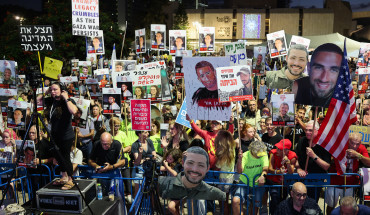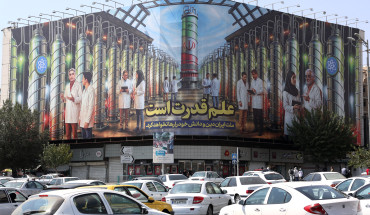Remarks delivered by Frances Fragos Townsend at The National Press Club at The Middle East Institute’s 61st Annual Conference, October 30th 2007.
Overview
Ms. Townsend outlined the formation and bolstering of effective partnerships in the Middle East as the primary US goal in the war on terror. She defined called weapons of mass destruction (WMC) as the biggest threat in the war on terror. She also discussed the urgency of denying support and sanctuary of rogue states for terrorism and identifying Iran, Syria, Sudan, North Korea and Cuba as state sponsors of terrorism. She underscored the importance of denying terrorists control of any nation and addressed Iraq as a central front in the War on Terror.
Event Summary
Townsend reiterated the words of President Bush regarding the United States’ vital and enduring interests in the Middle East and in good relationships with our partners based on common interests of faith, education and commerce. She reminded the audience that the Middle East history as a key source of trade dates well before oil and that it is a vital US interest to promote stability in the Middle East.
From her vantage point, the primary goals in the region are the effective use of all tools of national power and influence, the killing and capture of terrorists, denying them safe haven, preventing access of terrorists to weapons of mass destruction, cutting off funding to terrorists and their organizations, and eradicating state-based terrorism.
She discussed the persistent, evolving terrorist threat in the United States posed by violent extreme Islamic groups, the most prominent of which is al-Qa‘ida, and its state and non-state supporters. She noted that the mission of terrorists is not based on Islam, but rather a violent ideology based on hate, fear and oppression, and that terrorists pose a threat to both Muslims and non-Muslims worldwide. Indeed, she noted, most of the terrorist attacks since 9/11 have occurred in Muslim countries and many victims have been Muslims.
The US is fighting back against its enemies, she said, but needs strong partners and allies to win the war on terror. She outlined effective partnerships as the foundation to winning the War on Terror in order to cooperatively prevent attacks by denying essential funding, travel, and communications of terrorist networks.
She identified countries in North Africa and the Kingdom of Saudi Arabia as particularly strong partners working towards regional and sub-regional cooperation with the US in the war on terror.
Ms. Townsend said the biggest threat in the war on terror is the presence of weapons of mass destruction (WMD) in the hands of rogue states and terrorist organizations. She discussed the global initiative against nuclear terrorism launched in 2006 by Russia and the US, which currently encompasses 64 countries. She also discussed the urgency of denying support and sanctuary of rogue states for terrorism, identifying Iran, Syria, Sudan, North Korea and Cuba as state sponsors of terrorism. More optimistically, she discussed the removal of some states from the list of rogue states including Iraq and Libya.
She underscored the importance of denying terrorists control of any nation and addressed Iraq as a central front in the war on terror. It is urgent, she emphasized, that partners in the war on terror prevent terrorists from exploiting ungoverned and under-governed areas of the world. Lastly, she placed priority in the long-term on the advancement of freedom and liberty as alternatives to the hatred and oppression of terrorism, encouraging countries to open their political systems to provide citizens with greater voice and participation. She ensures that the imposition of US-style democracy is not the goal, but rather a strict adherence to universal human rights, as political freedoms and human rights are not western values, but universal.
During the question-and-answer period, Townsend responded to an array of questions critical of US policies. Responding to question about a potential confrontation with Iran, she identified it as the largest state sponsor of terrorism and used the example of Iran-based funding for Hizbollah that is disabling Lebanon to outline the threat Iran currently poses in the region. In response to another question on the use of torture by the US, Townsend reiterated that the US does not torture. She discussed the US’s unwillingness to disclose information about specific interrogation techniques on the basis that it would enable enemies to train against them. She stated that the interrogation techniques are tough, but emphasized that they do not constitute torture.
About this Event
Remarks delivered at The National Press Club at The Middle East Institute’s 61st Annual Conference, October 30th 2007.
Attributions
Amy Aminah Teachout, an undergraduate student in Political Science at the American University in Washington, DC and a Programs Department intern at the Middle East Institute, wrote this brief. This brief was peer-edited by Research Intern, Matthias Hildebrandt, a graduate from the Graduate School of International Studies, University of Denver (CO).
Disclaimer: Assertions and opinions in this Summary are solely those of the above-mentioned author(s) and do not reflect necessarily the views of the Middle East Institute, which expressly does not take positions on Middle East policy.












